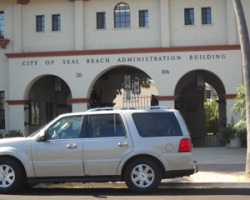The City of Seal Beach’s search for new oil revenue is off, again. After a somewhat heated debate at the June 11 City Council meeting, the Seal Beach City Council voted two to two, twice, effectively turning down two different motions to approve contracts to seek out new oil revenue.
The failure to approve a plan to secure new oil revenue came at the start of a meeting where the city’s dire finances were laid bare. On Monday, the city council also voted to adopt a budget with a roughly $400,000 deficit and put in motion plans to place a sales tax hike on the November ballot.
The contract city staff presented to council for approval was with Greg Kirste, principal of Municipal Petroleum Analysts or MPA. The contract tasked MPA with finding new sources of revenue from the oil industry. Kirste would have received a 15 percent contingency fee on any new one-time or ongoing revenue he identified that the city collected. At the meeting, Kirste told council members more research needed to be done. In the past, he has estimated there is up to $20 million owed to the residents of Seal Beach by oil companies in the form of unpaid taxes, fees or other payments. The city had two previous contracts with MPA in 2013 and 2014 and around that time MPA secured $216,000 in payments from the oil company BreitBurn.“85 percent of something is 100 percent more of something that we didn’t have,” Seal Beach Finance Director Vikki Beatley told council members when presenting what she called the “no-cost agreement.” She called it a “good contract for the city” because she said Kirste would only be paid when revenue comes into the city.
“I just don’t see the downside here,” said District One Councilwoman Ellery Deaton, who along with District Five Councilwoman Sandra Massa-Lavitt, voted in favor of giving Kirste a non-exclusive contract for one year which included an opt-out clause for the city. “If tonight we turn this down what we are saying is, we are, yes, going to cut your service, and yes, we’re going to go out and tax, tax, tax,” Deaton said at the meeting.
Mayor Mike Varipapa and District Four Councilwoman Schelly Sustarsic voted against the Kirste deal. Both expressed concern about Kirste’s experience compared to other potential contractors and the 15 percent contingency fee. “A 15 percent contingency on potential hundreds of thousands and quite possibly millions of dollars appeared to be too much money for a consultant,” Mayor Varipapa wrote in an email message the day after the meeting.
“While this may be good for the city in the short run, we don’t have to pay money up front, in the long run, if he actually has identified all of this money, we’re still giving away 15 percent,” Sustarsic said at Monday’s meeting. Sustarsic also noted the Kirste contract did allow for Kirste to be paid a $200 hourly fee for his services in some instances, such as if the city decided to not pursue a new source of revenue that he had identified. City Attorney Craig Steele said he did not see that scenario as being realistic but acknowledged the hourly fee mechanism was indeed in the contract.
District Two Councilman Thomas Moore recused himself from the vote because of a potential conflict of interest. Moore said the oil revenue recovery effort could have a “material financial effect” on a client of his employer, Crimson Pipeline. The votes were reversed, but had the same deadlocked outcome, when Mayor Varipapa offered what he called a “compromise” that council ended up considering before the MPA contract.
Mayor Varipapa expressed concern about Kirste’s resume and five years of experience compared to the firm Clark and Greene, which also submitted a proposal to the city, and claimed to have decades of experience, an employee with a Ph.D. and numerous contracts with other cities. Varipapa’s motion was to hire Clark and Greene for $45,000 to research potential oil revenue for six to twelve months and then, if that didn’t work out, hire Kirste and MPA.
“Where are you going to get the $45,000?” Councilwoman Deaton asked after Varipapa’s suggestion. “We don’t have it,” she responded.
The proposal went nowhere after Varipapa and Sustarsic voted for it, Deaton and Massa-Lavitt voted against it and Councilman Moore couldn’t vote because of his recusal.
What’s Next
This city has been looking to new oil money for years as a way to help the city’s finances, but it’s not clear what’s next after Monday’s meeting.
Councilwoman Massa-Lavitt said it was “very disappointing” right after the vote for Kirste’s contract ended in a deadlock. “To walk away from that money,” Massa-Lavitt said almost dumbfounded.
That sentiment was echoed by Councilwoman Deaton. In an email message, the day after the meeting she wrote, “An argument was made last night that 15 percent was too much money to pay MPA for finding revenue that no one else has ever found. Today we have 100 percent of nothing and now have to go to the voters and ask for more sales tax instead. I am very disappointed.”
“This was a no-risk, no-cost free contract to recover millions in already owed taxes,” Kirste wrote in a text message after the meeting and added, “The residents of Seal Beach lost today.”
Mayor Varipapa appeared to not be giving up on oil revenue. In an email message, the day after the meeting he wrote: “We will continue to pursue these revenues.”
While Beatley expressed disappointment in the minutes after the meeting, in an email message the next day, she wrote, “The decision was the Council’s to make and although the oil revenue recovery item failed to pass, we now have a new clear direction from which to move forward.”
You can watch the entire City Council Meeting here: http://sealbeach.primegov.com/portal/Meeting?compiledMeetingDocumentId=912





